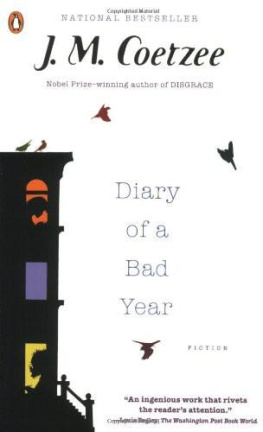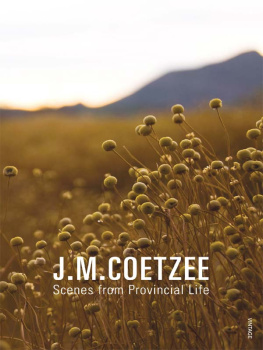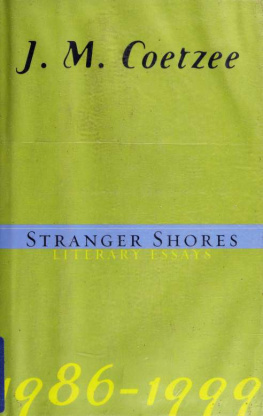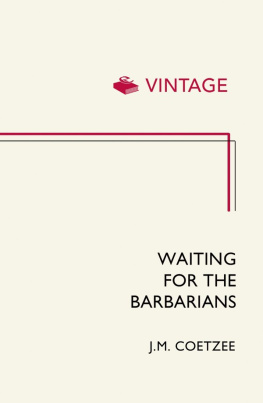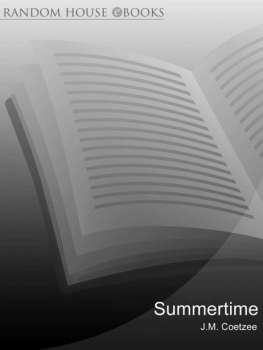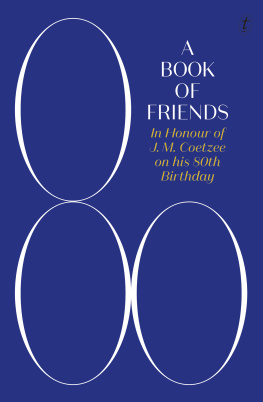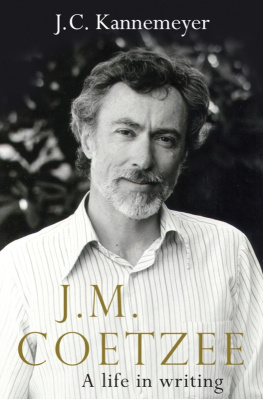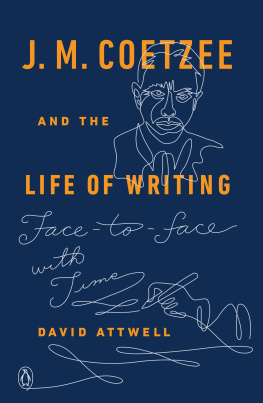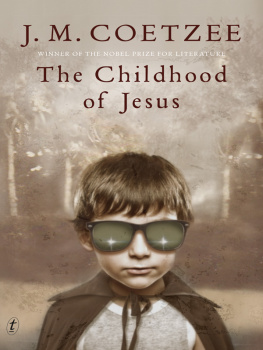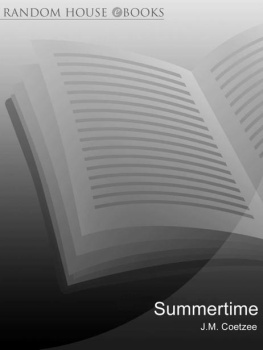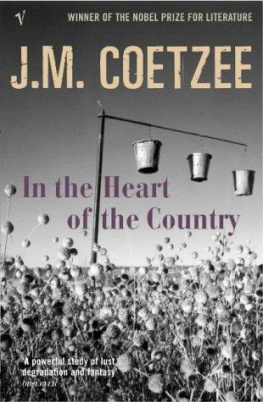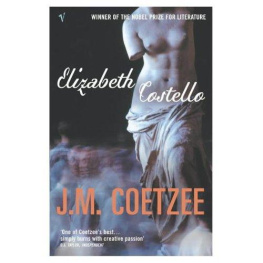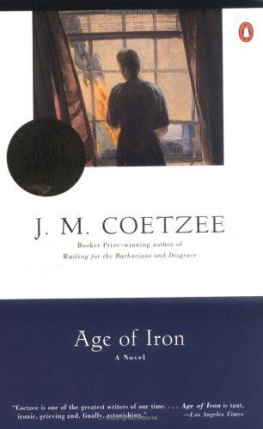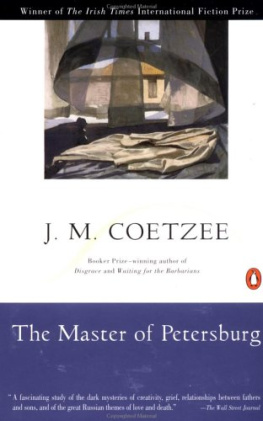Coetzee - Diary of a Bad Year
Here you can read online Coetzee - Diary of a Bad Year full text of the book (entire story) in english for free. Download pdf and epub, get meaning, cover and reviews about this ebook. year: 2007, publisher: Harvill Secker, genre: Art. Description of the work, (preface) as well as reviews are available. Best literature library LitArk.com created for fans of good reading and offers a wide selection of genres:
Romance novel
Science fiction
Adventure
Detective
Science
History
Home and family
Prose
Art
Politics
Computer
Non-fiction
Religion
Business
Children
Humor
Choose a favorite category and find really read worthwhile books. Enjoy immersion in the world of imagination, feel the emotions of the characters or learn something new for yourself, make an fascinating discovery.
Diary of a Bad Year: summary, description and annotation
We offer to read an annotation, description, summary or preface (depends on what the author of the book "Diary of a Bad Year" wrote himself). If you haven't found the necessary information about the book — write in the comments, we will try to find it.
Diary of a Bad Year — read online for free the complete book (whole text) full work
Below is the text of the book, divided by pages. System saving the place of the last page read, allows you to conveniently read the book "Diary of a Bad Year" online for free, without having to search again every time where you left off. Put a bookmark, and you can go to the page where you finished reading at any time.
Font size:
Interval:
Bookmark:
J M Coetzee
Diary Of A Bad Year
12 September 2005 - 31 May 2006
Every account of the origins of the state starts from the premise that we - not we the readers but some generic we so wide as to exclude no one - participate in its coming into being. But the fact is that the only we we know - ourselves and the people close to us - are born into the state; and our forebears too were born into the state as far back as we can trace. The state is always there before we are.
(How far back can we trace? In African thought, the consensus is that after the seventh generation we can no longer distinguish between history and myth.)
If, despite the evidence of our senses, we accept the premise that we or our forebears created the state, then we must also accept its entailment: that we or our forebears could have created the state in some other form, if we had chosen; perhaps, too, that we could change it if we collectively so decided. But the fact is that, even collectively, those who are under the state, who belong to the state, will find it very hard indeed to change its form; they - we -are certainly powerless to abolish it.
It is hardly in our power to change the form of the state and impossible to abolish it because, vis-a-vis the state, we are, precisely, powerless. In the myth of the founding of the state as set down by Thomas Hobbes, our descent into powerlessness was voluntary: in order to escape the violence of internecine warfare without end (reprisal upon reprisal, vengeance upon vengeance, the vendetta), we individually and severally yielded up to the state the right to use physical force (right is might, might is right), thereby entering the realm (the protection) of the law. Those who chose and choose to stay outside the compact become outlaw.
My first glimpse of her was in the laundry room. It was midmorning on a quiet spring day and I was sitting, watching the washing go around, when this quite startling young woman walked in. Startling because the last thing I was expecting was such an apparition; also because the tomato-red shift she wore was so startling in its brevity.
The law protects the law-abiding citizen. It even protects to a degree the citizen who, without denying the force of the law, nevertheless uses force against his fellow citizen: the punishment prescribed for the offender must be condign with his offence. Even the enemy soldier, inasmuch as he is the representative of a rival state, shall not be put to death if captured. But there is no law to protect the outlaw, the man who takes up arms against his own state, that is to say, the state that claims him as its own.
Outside the state (the commonwealth, the statum civitatis), says Hobbes, the individual may feel he enjoys perfect liberty, but that liberty does him no good. Within the state, on the other hand, every citizen retains as much liberty as he needs to live well in peace, [while] enough liberty is taken from others to remove the fear of them To sum up: outside the commonwealth is the empire of passions, war, fear, poverty, nastiness, solitude, barbarity, ignorance, savagery; within the commonwealth is the empire of reason, peace, security, wealth, splendour, society, good taste, the sciences and goodwill.1
What the Hobbesian myth of origins does not mention is that the handover of power to the state is irreversible. The option is not open to us to change our minds, to decide that the monopoly on the exercise of force held by the state, codified in the law, is not what we wanted after all, that we would prefer to go back to a state of nature.
We are born subject. From the moment of our birth we are subject. One mark of this subjection is the certificate of birth. The perfected state holds and guards the monopoly of certifying birth. Either you are given (and carry with you) the certificate of the state, thereby acquiring an identity which during the course of your life enables the state to identify you and track you (track you down); or you do without an identity and condemn yourself to living outside the state like an animal (animals do not have identity papers).
The spectacle of me may have given her a start too: a crumpled old fellow in a corner who at first glance might have been a tramp off the street. Hello; she said coolly, and then went about her business, which was to empty two white canvas bags into a top-loader, bags in which male underwear seemed to predominate.
Not only may you not enter the state without certification: you are, in the eyes of the state, not dead until you are certified dead; and you can be certified dead only by an officer who himself (herself) holds state certification. The state pursues the certification of death with extraordinary thoroughness - witness the dispatch of a host of forensic scientists and bureaucrats to scrutinize and photograph and prod and poke the mountain of human corpses left behind by the great tsunami of December zoo4 in order to establish their individual identities. No expense is spared to ensure that the census of subjects shall be complete and accurate.
Whether the citizen lives or dies is not a concern of the state. What matters to the state and its records is whether the citizen is alive or dead.
The Seven Samurai is a film in complete command of its medium yet nave enough to deal simply and directly with first things. Specifically it deals with the birth of the state, and it does so with Shakespearean clarity and comprehensiveness. In fact, what The Seven Samurai offers is no less than the Kurosawan theory of the origin of the state.
Nice day, I said. Yes, she said, with her back to me. Are you new? I said, meaning was she new to Sydenham Towers, though other meanings were possible too, Are you new on this earth? for example. No, she said. How it creaks, getting a conversation going. I live on the ground floor, I said. I am allowed to make gambits like that, it will be put down to garrulity. Such a garrulous old man, she will remark to the owner of the pink shirt with the white collar, I had a hard time getting away from him, one doesnt want to be rude. I live on the ground floor and have since 1995 and still I dont know all my neighbours, I said. Yeah, she said, and no more, meaning, Yes, I hear what you say and I agree, it is tragic not to know who your neighbours are, but that is how it is in the big city and I have other things to attend to now, so could we let the present exchange of pleasantries die a natural death?
The story told in the film is of a village during a time of political disorder - a time when the state has in effect ceased to exist - and of the relations of the villagers with a troop of armed bandits. After years of descending upon the village like a storm, raping the women, killing those men who resist, and bearing away stored-up food supplies, the bandits hit on the idea of systematizing their visits, calling on the village just once a year to exact or extort tribute (tax). That is to say, the bandits cease being predators upon the village and become parasites instead.
One presumes that the bandits have other such pacified villages under their thumb, that they descend upon them in rotation, that in ensemble such villages constitute the bandits tax base. Very likely they have to fight off rival bands for control of specific villages, although we see none of this in the film.
The bandits have not yet begun to live among their subjects, having their wants taken care of day by day - that is to say, they have not yet turned the villagers into a slave population. Kurosawa is thus laying out for our consideration a very early stage in the growth of the state.
The main action of the film starts when the villagers conceive a plan of hiring their own band of hard men, the seven unemployed samurai of the title, to protect them from the bandits. The plan works, the bandits are defeated (the body of the film is taken up with skirmishes and battles), the samurai are victorious. Having seen how the protection and extortion system works, the samurai band, the new parasites, make an offer to the villagers: they will, at a price, take the village under their wing, that is to say, will take the place of the bandits. But in a rather wishful ending the villagers decline: they ask the samurai to leave, and the samurai comply.
Next pageFont size:
Interval:
Bookmark:
Similar books «Diary of a Bad Year»
Look at similar books to Diary of a Bad Year. We have selected literature similar in name and meaning in the hope of providing readers with more options to find new, interesting, not yet read works.
Discussion, reviews of the book Diary of a Bad Year and just readers' own opinions. Leave your comments, write what you think about the work, its meaning or the main characters. Specify what exactly you liked and what you didn't like, and why you think so.

